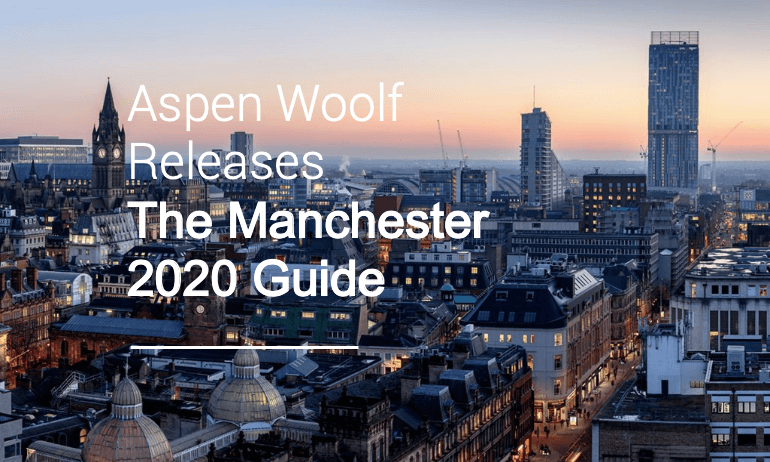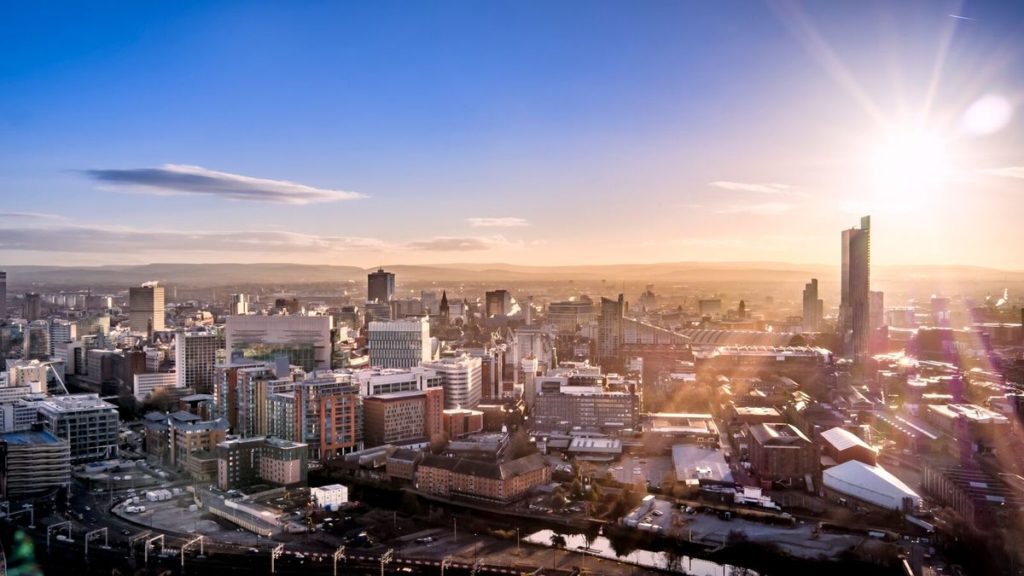Property Investment in Manchester – A Guide by Aspen Woolf

Property experts Aspen Woolf examine property investment in Manchester
Manchester stands out as one of the most successful cities in the UK for culture, industry and quality of life. Following decades of industrial decline in the mid-20th century, Manchester completely reinvented itself as the modern, outward facing destination it is today.
It’s a city with a buoyant economy, a rich heritage and strong cultural and sporting ties. And recently, the jewel of the Northern Powerhouse has benefited from investment opportunities for residential property, infrastructure improvements and media, further boosting its reputation.
High performing city
While often considered England’s second city, Manchester is also the sixth largest in the country. Manchester City Council estimates that the residential population of the city reached 575, 400 in 2019.
Economically, Manchester stands with the highest performing cities in Europe. With a steadily increasing population mostly comprising young professionals and students, extensive infrastructure development, construction and regeneration, Manchester is hugely attractive for property investors of all kinds.
EY’s annual Economic Forecast predicts an economic growth for Manchester of 1.2% by 2021, one of the highest in the UK. Manchester City Council measured the overall Gross Value Added (GVA) increase of the city between 2016 and 2017 as 4.3%, compared with 3.6% for the whole country. And in March 2019 the UK Business Count 2019 compiled by the Office of National Statistics (ONS) recorded 22,630 businesses in the city.
Over recent years, there has been an influx of multinational enterprises to Manchester, which further boosts the need for residential property in the city. As part of a major redevelopment centring on the Soapworks building in Salford in 2018, TalkTalk relocated its HQ. This redevelopment of the River Irwell area also encompasses the nearby flagship Bupa building. A few years prior, the BBC moved many of its TV, radio and sports operations to Media City in Manchester, and ITV moved in opposite.

Demand for housing boosts investment prospects
A consequence of a thriving economy is a young population. For buy-to-let investors, the combination of a mobile and youthful professional population along with a vast body of students means yields remain high, averaging at around 8% in some areas of the city according to recent data.
The city’s population is predicted to reach 644,100 by 2025, thanks in part to its popularity with its graduate population. And according to Rightmove, the average property price in Manchester City Centre is £221,419, which is 4% more than the figures from 2017.
The recent Living With 2020 Vision Regional Forecasts Report from JLL puts Manchester firmly at the top of UK cities with the most significant increase in rental growth and house prices for the next few years. The report predicts that Manchester will experience the highest increase in sales prices up until 2025, which are forecast to increase by 17.1%. This is higher than the national average which stands at 14.8%.
In addition, a report from the Financial Times puts Manchester at the top of its list for best cities in Europe for business 2020/2021. The demand for property in Manchester will continue, which present exciting opportunities for buy-to-let investors.
Construction and development projects in Manchester
More than a fifth of Manchester’s population are employed in the financial, professional and scientific sectors. The city’s digital sector is growing fast, as the economy continues to diversify. This growth is also driving demand for high quality office space in the city.
The surge in demand for residential property and office property has led to record levels of construction development projects in the city. Manchester’s skyline has transformed over the last few years, due in part to funding from the European Structural programme worth around £336 million. Part of the Greater Manchester Spatial Framework also includes the delivery of a minimum of 201,000 new homes by 2037.
Exciting residential developments underway across the city including The Loom, Vulcan Mill. One of the regeneration projects in Manchester breathing new life into old buildings to provide modern, stylish accommodation for the vast numbers of urban professionals moving in. Offering investors gross expected yields of up to 5.6%, this development is an excellent example of the future of Manchester residential accommodation.
Other projects funded by private and public investments that are set to continue the city include:
- £800 million for the Manchester Airport City Enterprise Zone, which will include nearby business and medical parks.
- £6 billion for the Manchester to Sheffield Link Road, which will be the longest in Europe. It will slash 90 minutes from the journey time between the two cities.
- £110 million for The Factory development, which is an exhibition and theatre space constructed on the old Granada Studios site. Projected to create more than 2,500 jobs and to contribute at least £140 million into the local economy.
- £3 billion for Manchester Place, a development of more than 10,000 residential homes across 150 acres of land. This will also include Manchester University campuses.
- £1 billion agreement between the Abu Dhabi United Group and Manchester City Council will build 6,000 new homes in East Manchester.
- £1 billion into the expansion of the northern BBC HQ MediaCityUK. The project will double the size of the base and create many new jobs. The new development will include more than 1,400 new homes and more studio and production space.
There is no doubt that the UK’s property sector is strongest in the north of England. And Manchester is the shining light of the Northern Powerhouse. Big things are on the city’s horizon as HS2, increased investment and regeneration and the strong economy continue to boost its credentials as a property investment hotspot. Click below and find out our latest projects in Manchester.


